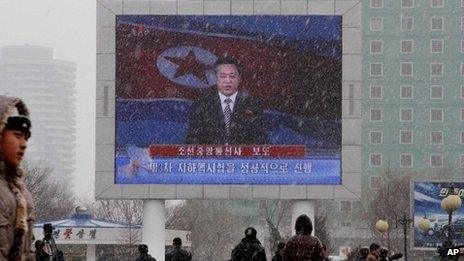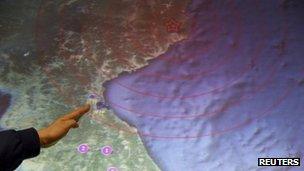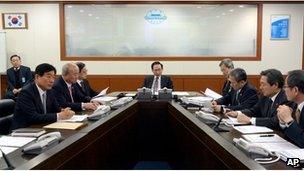North Korea’s nuclear test: Third time unlucky?
- Published

The announcement was swiftly condemned internationally
Widely tagged as unpredictable, sometimes North Korea is anything but. In 2006 and 2009, it launched long-range rockets. The latter, but not the former, was claimed as a satellite launch.
Not content with one big bang, in both cases a nuclear test followed within weeks. Each was roundly condemned by unanimous UN Security Council (UNSC) resolutions, and sanctions applied.
A defiant North Korea rejected these and insisted on its right to a nuclear deterrent.
Hence 2012's two big rocket launches - a damp squib in April, then a resounding success in December which really did put a satellite in orbit - made it highly likely that a third nuclear test would follow.
In January Pyongyang, feigning anger at the latest unanimous censure from the UNSC, as good as confirmed this. Satellite photos of its test site at Punggye-ri in Kilju county in the remote north-east clearly showed that preparations were under way. We now learn that China and the US were formally notified yesterday, although no date was given.

The tremors were detected in South Korea and felt as far as China
The test is thus no surprise. At 11:57 local time (02:57 GMT), South Korea detected a seismic tremor from Kilju of magnitude 4.9.
The defence ministry in Seoul put the force of the explosion at 6-7 kilotons (Hiroshima was 15kT), making it the North's biggest bang yet after less than 1kT in 2006 - possibly a partial failure - and 4.6 kT in 2009.
Both bigger and smaller
Confirming the test soon after, the North Korean Central News Agency (KCNA) boasted of "an atomic warhead that is lighter and miniaturised but with a big explosive charge".
That claim cannot be confirmed, but a key tipping point would be if Pyongyang can indeed make its big bang small enough to fit on one of its big rockets - meaning it would then have a viable nuclear weapon to threaten its neighbours and beyond.
World condemnation was swift. South Korea's outgoing President Lee Myung-bak entered a bunker to hold a security meeting.
Markets in Seoul were more blase. Analysts attributed a 0.26% stock market fall to foreign-led selling for commercial reasons, not political.
The South's next (and first female) leader, Park Geun-hye, who takes office on 25 February, also strongly criticised a test which shatters, or at least postpones, her hopes of easing Lee's hard line and building "trustpolitik" with the North.

South Korean President Lee Myung-bak took to a bunker to hold an emergency meeting
Ms Park is reorganising the security team in the Blue House (presidential office), and has been slow to choose her cabinet. This is not a good time for those who will soon be in charge in Seoul to look, still less be, unprepared.
The timing resonates north of the Demilitarised Zone too. Just as December's missile soared a year after Kim Jong-il's demise, the nuclear test marks the late "dear leader's" birthday on 16 February.
Both are filial Confucian gestures by his young son and heir, Kim Jong-un: reassuring any doubters at home (perhaps the military) and abroad that he, and North Korea, are no pushover.
The timing is piquant elsewhere too. US President Barack Obama, who swiftly called the test "highly provocative", had hoped to focus on jobs in his State of the Union address due later today. His first term policy of "strategic patience" with Pyongyang now looks complacent.
China meanwhile is on holiday to welcome in the Year of the Snake. In March its new leader Xi Jinping will assume the state presidency; he already heads the ruling Communist Party. He could do without this rude greeting and challenge from a regime kept afloat by Chinese aid and trade.
Keep calm and carry on
Beijing's reaction so far has been mild. As in 2006 and 2009, in near-identical language, the foreign ministry expressed "firm opposition" to the test, called on Pyongyang not to provoke further, and urged everyone else to keep calm and carry on. But this refrain is wearing thin.
Two earlier articles in the Communist Party-owned daily paper Global Times went further, saying China should cut aid to punish the Kim regime if it tested a nuclear device.
Comment on Chinese social media, increasingly uncensored on this topic, was outraged.
Many felt China was the target of its supposed ally; one likened their relations to "raising a mad dog to protect your house". Kilju is near the border, and tremors were felt in the north-eastern province of Jilin.
What next? An emergency UNSC meeting on Tuesday will once again censure North Korea, and once again ramp up sanctions already imposed under three previous UNSC resolutions. As it happens, South Korea currently chairs the council; the North will make much of that.
Yet it is getting hard to find anything left to sanction. Japan has gone furthest: it already bans all bilateral trade.
But China has meanwhile expanded its own trade and investment, hoping to defang a tiresome neighbour by getting it to see the benefits from peaceful commerce.
To provoke Beijing into revising such support is not a smart move. One Chinese blogger has put it bluntly: "North Korea is headed down the wrong path. Its people will pay the price for the country's mistakes. The legitimacy of North Korean rule should be reconsidered."
That last sentence sounds like a call for regime change. Its author was Hu Xijin, the editor of Global Times. Kim Jong-un had better be careful not to bite the dragon's tail too hard.